Letter from Africa: World Cup woes
- Published
- comments
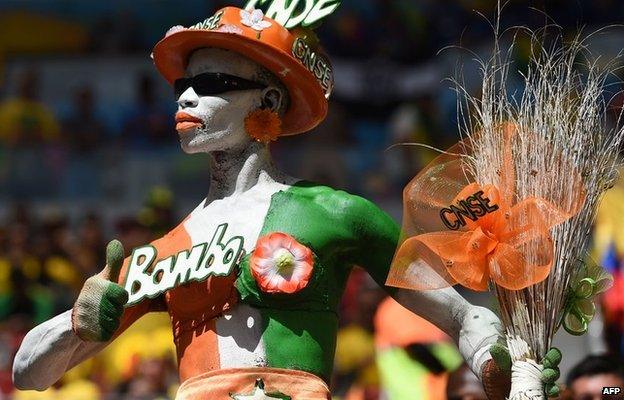
In our series of letters from African journalists, filmmaker and columnist Farai Sevenzo looks at the state of African football, bedevilled by the perennial problems of poor organisation, tactical indiscipline and rows over money.
There isn't a city or village, bar or community hall - except, of course, those being targeted by African jihadists - where the World Cup in Brazil has not taken centre stage over the past two weeks.
Unlike any other continent, Africa's footballers belong to us all - not to Nigeria, Ghana, Cameroon, Ivory Coast or even Algeria - but to the whole expectant mass of us in our constant need to reassert ourselves as a continent of heart and talent, especially on the world stage that is Brazil 2014.
Four years on from the first World Cup on African soil, many of the same splattering of players have landed on Brazil's green fields only to raise our anxiety levels as we watched mediocre football garnished with ageing strikers, petulant red cards and kamikaze defences.
'Idiotic penalty'
Furthermore, we smelt the stench of mutiny and rebellion over money amongst the ranks of our African stars all the way across the Atlantic Ocean separating Brazil from the west coast of Africa.
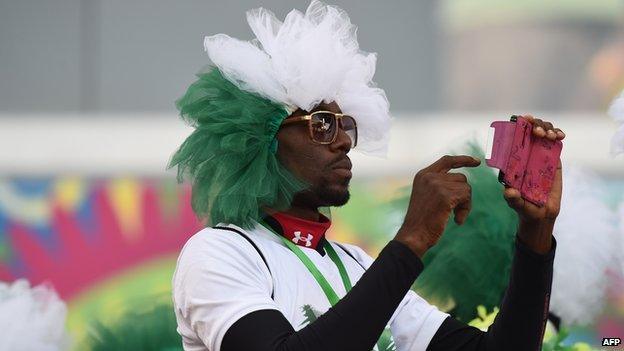
Nigeria performed creditably but have still never made it beyond the last 16 of any World Cup
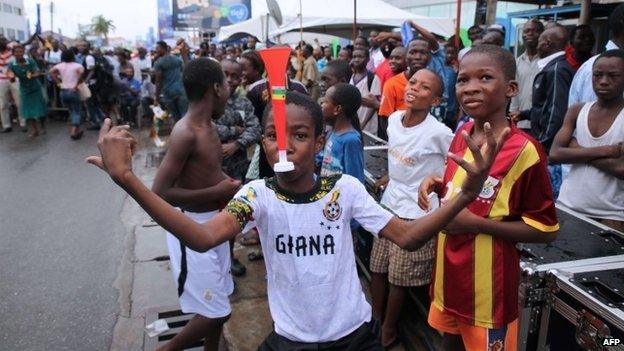
Ghana gained just a single point, disappointing the fans back home
Ghana's President John Mahama was in no mood to have his football interrupted by players who were bickering over unpaid fees and he dispatched a plane with $3m (£1.76m) to appease the feuding team.
The Black Stars, meant to light up our World Cup with the purest of African football as they had done in 2010, had been threatening a power cut.
Cameroon's Indomitable Lions, who at one stage had threatened not to board the plane to Brazil over unpaid money, played without teeth.
Ivory Coast's Elephants, long considered the most talented team we could offer, surrendered a chance to reach the last 16 with an idiotic penalty in the dying seconds and will go down in history as the team that could never deliver.

Africa: Serial underperformers?
Pele famously predicted that an African team would win the World Cup by 2000
No African team has ever reached the semi-finals
Only three teams have reached the quarter-finals: Cameroon in 1990; Senegal in 2002 and Ghana in 2010
2014 was the first time two African teams reached the last 16
More lows than highs for Africa in Brazil

Would there be a silver lining in these dark clouds over Brazil? And would that lining be all about the silver? Nigeria's Super Eagles - Africa's current champions - soon missed a training session over disagreements concerning their bonuses.
'Shabby treatment'
It is altogether some miracle then that, for the first time, we had two teams through to the last 16 of this world cup as Algeria and the disgruntled Nigerians continued to stamp Africa's mark on Brazil.
But why are things so fraught in African football federations? Why is it so easy for the headlines about African football to look like allegories of bad politics and corrupt governance?
It doesn't matter where you are - Zimbabwe, South Sudan, South Africa and beyond - Africa's football fans bemoan the administrators who generally fail to provide the national teams with the support they need.
Talent and potential remain unfulfilled, teams are stranded at football tournaments because federations could not afford return tickets, and South Africa, the hosts of 2010, have had 23 coaches in 20 years.
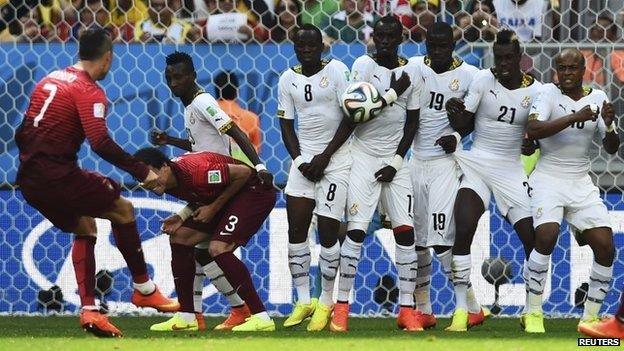
Ghana's president sent a plane with cash to end a dispute over payments to the team
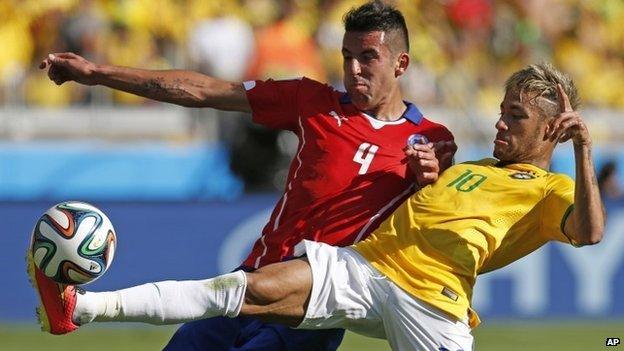
Brazil's Neymar does not have to deal with the same issues as Africa's stars
Those that have made it to Brazil cannot escape the organisational chaos of their own federations as the constant bickering over bonuses and fees has shown.
Yet, a country's appearance at the World Cup final is worth, at the last count, $8m.
There should, should there not, be enough silver to pay the talent? When we consider Ghana's spectacular performance four years ago, Cameroon's regular appearance at tournaments, and Nigeria's status as reigning African champions - where has all the silver gone? Why is the talent treated so shabbily?
'Peacocks'
It is almost certainly the case that football is too close to political patronage in many countries and those that run our federations are closer to government than the fans.
They will preach impractical patriotism as incentive enough to play, and leave themselves open to the lure of criminals' betting syndicates and bogus international fixtures to line their own pockets.
Is it any wonder then that there is a desperate lack of trust between the players and their federations?
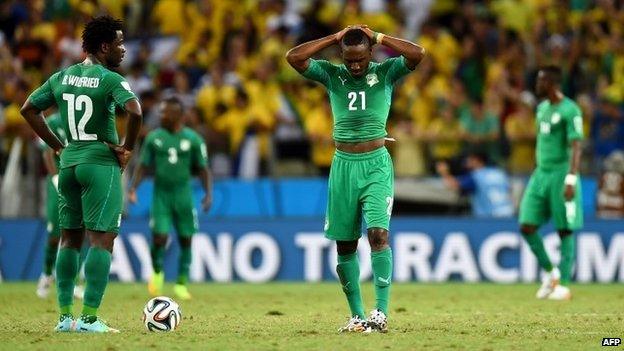
The talented Ivory Coast team were on the verge of qualification until they conceded a last-minute penalty
Moreover, the African talent on display on the fields of Brazil is made up of international stars from every league in the world who at times carry their poorer countrymen, but who cannot be expected to work under the kind of dodgy federations the Messis, Ronaldos and Neymars of this greatest show on earth never have to deal with.
It is then we saw the egos. I don't know what other football fans can see on their televisions, but there were African coaches standing on the side lines who we knew had not picked the team, whose body language said: "I have no control over these moneyed and arrogant peacocks and this is not my fault."
As the curtain fell on Africa's participation at Brazil 2014, Nigeria and Algeria lifted the football from the mediocrity of Africa's football administrators at last - losing in the dying minutes to France and Germany - and lifted us all from the nightmare images of players kissing bundles of cash.
Having previously offered his resignation following his Africa Cup of Nations triumph, citing "a lack of support and respect", Nigeria's manager Stephen Keshi did resign after the French defeat - perhaps to become South Africa's 24th coach - but he has left a young exciting attacking team we will no doubt watch for years to come.
Planeloads of cash will not win us a World Cup, but it is time to treat African talent as talent and pay them what they're worth.
And that means talent on and off the field - for football administration should not be a job for life as it so often is in many federations.
If you would like to comment on Farai Sevenzo's column, please do so below.